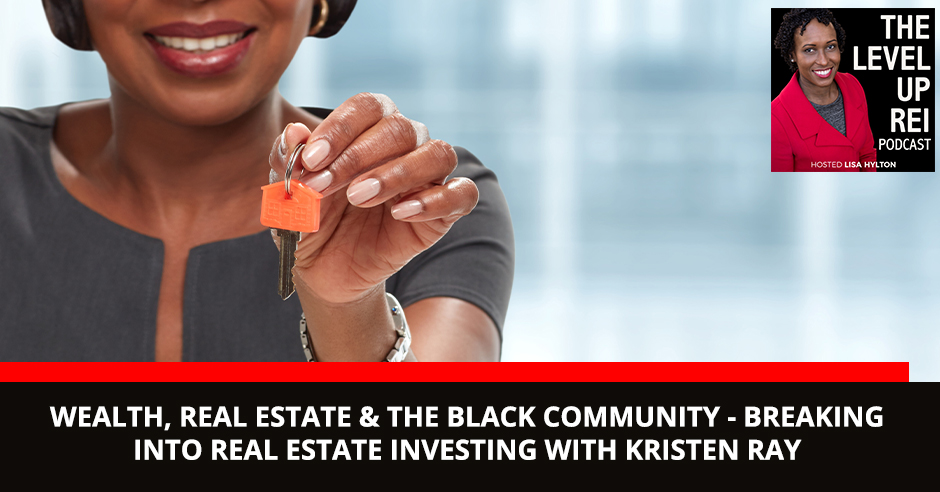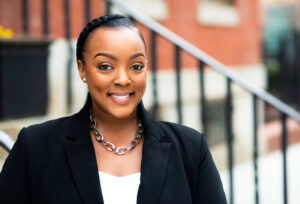
Breaking into real estate investing presents many challenges, but with the right preparation, it’s doable! On today’s podcast, Lisa Hylton brings in the Co-founder of Vital Investment Partners, Dr. Kristen Ray, to talk about how she got into real estate investing, Dr. Kristen spent much of her earlier days pursuing an education in the nursing sector and crossed over to real estate investing in 2011. Since then, she has grown her real rental portfolio to include single family, multifamily properties, and 142 units of syndication deal in 2020. Want to set yourself up for lifelong success of creating passive income? Then tune in and learn from those who’ve been there.
—
Watch the episode here
Listen to the podcast here
Wealth, Real Estate & The Black Community – Breaking Into Real Estate Investing With Kristen Ray
I’m super excited. I’m back again with another episode. Here in the month of February 2020, the theme is Wealth, Real Estate and the Black community celebrating Black History Month. I’m bringing on some amazing real estate entrepreneurs and investors to talk about their experience in building wealth through real estate and advice they would give to the Black community so we can continue to altogether, grow and add value to the lives of our community. I have on the show, Dr. Kristen Ray. She is a real estate investor from the DMV area.
That is the District of Columbia, Maryland, and Virginia. She spent much of her earlier days pursuing an education in the nursing sector and crossed over to real estate investing in 2011. Since then, she has grown her real rental portfolio to include single-family, multifamily properties and 142 units syndication deal in 2020. Dr. Ray’s passion is helping busy professionals grow their wealth through real estate investing as a wealth-generating tool. That is perfect for this theme in wealth, real estate and the Black community. Welcome to the show, Kristen. I’m happy to have you.
Thank you so much. I appreciate being here with you Lisa.
To get started, can you share with our readers, back in 2011, how did you get started investing in real estate?
That’s a question I’m often asked. I fell into it. In 2011, unfortunately, I lost my great grandfather, who then left behind some properties that got passed down to my brother and me. That’s how I got started. I had some properties, tenants were already in them and at the time, I was in school for my Master’s degree. I had a six-month-old baby whom I was also taking care of. I was working nights and going to school during the day. The last thing I wanted was another responsibility. We looked to sell those properties, but it wasn’t a good time. We decided to hold on to them and we still have them.
Diving right into those, what were some of the key takeaways from that experience of taking on, some of the memorable key lessons that you could share with my audience? Maybe 2 or 3 of them come to mind that would be beneficial for people owning long-term rentals.
For one, get your wills and any trust in order. It was messy when my great grandfather died in terms of the properties. One of the properties, we lost to a tax sale. I would say to get all of your personal affairs in order, particularly if you’re going to have a sizeable portfolio. If you plan to leave it to anyone other than Uncle Sam, make sure that you get that in order. That would be a key takeaway because you don’t want to work so hard just to give it to the government. Who wants to do that? Another key takeaway would be to screen well. The tenants that we did have had been great and we still have them.
My great-grandfather did a great job at choosing long-term tenants. They’re still stable and even through COVID, they haven’t missed a rent payment. We’re very grateful for that. The last takeaway would be to maybe get into a network of other investors so you can run questions by them because as the years went on and time went on, there were a lot of things we would run into and we didn’t know what we were doing. We were patch and go. At that particular time, because I fell into it, I didn’t have time to network and to pursue real estate at that time because I was in school. I had a young child and my life was very busy. Maybe if I had some friends in the field, some of those minor issues that came up, we could have dealt with them a lot better.

Breaking Into Real Estate: Location is everything. Certain locations will attract certain tenants.
At what point did the bug catch you? Are you now a full-time real estate professional?
I am considered a real professional, but I still do the practice. A pivotal moment came for me when I was still in school. This time I was going for my Doctorate and like many people, I didn’t want any student loans as most people don’t. I’m trying to figure out how I am going to pay for this without taking out a student loan. I ended up doing a cash-out refinance on those properties and use the equity to fund my doctoral studies. When I did that, I realized I’ve been thinking about finance and investing in money all wrong, “What am I doing?” Once I finally finished school, I decided to continue my pursuit of real estate investing. I got a lot more interested in it once I could see how you can leverage it and do other things and accomplish other goals other than collecting rent every month.
Right there, you’ve touched on something about how you did a cash-out refi to finance your education. It’s sounded like you would have done something differently. Would you have done something differently in that aspect or not?
In that aspect, no because at the time, I had my mind made up that I wanted to finish my studies. In hindsight, it is 2020. I certainly don’t regret it. It’s an accomplishment that I’ll always have. Sometimes I’m like, “Maybe I could have paid for half of my education and got a few more properties with some of the other money.” That then goes back to the question that if I did want to finish my studies, I would have had to take out student loans. The fact that I could get through my doctoral studies with no student loan debt put me in a good position. I don’t have any regrets about my decision. It woke me up to the other opportunities real estate can present other than having a tenant, collecting rent and fixing the leaky sinks.
Moving forward from that, can we talk a little bit about how you invest in real estate these days?
I’m a little bit of an opportunist. We are in the midst of the COVID-19 pandemic. In 2020, we closed on a syndication deal. I’m very much in love with multifamily, but I still don’t shy away from single-family rentals and I also don’t limit myself. I’m in the process of getting a fix and flip under contract because it’s a sellers’ market, at least where I am. We’re seeing prices go up, but rents are flat. However, if the numbers make sense, I will pursue it.
Can we talk a little bit about your syndication opportunity a bit since you’ve brought it up here? You said 142 units. What market was that located in?
That was in Columbia, South Carolina.
For the purpose of my readers, how do your syndication opportunities differ from the strategy of when you are going to buy a single-family outside of the fact that there are obviously more doors?
Leveraging your funds to get a good return is a great way to invest passively as a professional. Share on XThe short version of that is it is very much a relationship business. When you think about such a large undertaking, most people aren’t going to do that by themselves. You’re going to have partners you work with and you’re going to have to build a team. The underwriting is different. I feel like the fundamentals are similar, but you have to 10X it. You have to build teams and partnerships. Understanding each of those roles and there are attorneys involved. There are a lot more moving parts, but at the same time, you have more people to help you with those responsibilities.
You also talked about how you are an opportunist which sounds like you are pivoting. You’re willing to pivot in the face of all the different opportunities that come to you. As someone who’s personally experienced a lot of different opportunities, I’m curious about and I’m sure some of my readers are also in those boats, too. They’re bombarded or even come across tons of different ways in which to play in real estate. Could you talk about what are some of the strategies or things that you put in place to determine which opportunities work for you based on what you want to do?
Look at your long-term goal. What does that ultimately you want to achieve? For me, it’s passive cashflow. My primary strategy is to buy and hold rental properties and that will never change. It’s always a good time, in my opinion, to buy a cashflow rental if the numbers make sense. I’m always open to that opportunity, but I also don’t turn a blind eye if something else makes sense. That’s how I do it. I certainly would not call myself a fix and flipper by any stretch of the imagination, but if the opportunity presents itself because I do have experience with rehab because I have to rehab my rentals. I do have that experience. If an opportunity presented itself and the numbers make sense based on my personal criteria and what I felt comfortable doing, I’ll facilitate.
Because you also have that experience, you also have the contacts and relationships with contractors and etc., to get that work done. When that opportunity of a fix and flip comes by, it’s like, “I have my team in place that could easily flip that property.”
Yes, and it’s a relationship business. It’s going back to that fundamental aspect.
Moving into the aspect of the Black community, for a lot of our communities, in 2020, there has been tons of struggle and things that have always been issues. The inequalities have always been issues, but have not been brought to light until lately. Can you talk about the advice you would give, starting out with people who are in the beginning parts of their career, maybe coming out of college and getting started? What advice would you give to them for building wealth and perhaps even using real estate to accomplish building that wealth, given your experience?
My biggest piece of advice and the advice that I give my own children starting out would be to house hack. You don’t even have to be young, you can do it at any point, but starting out, you either get a duplex, live in one side and rent the other side out. Make sure the numbers make sense. If that doesn’t work, you’re young and in college, get a single-family and rent out rooms. That’s a great way to cut one of the largest expenses that you’ll have as your housing expense. The funds you would normally put towards your housing, you can now save/invest those. That is an excellent way to up your level of investing. Some people say, “I don’t want to live with other people.”
It’s one way. It’s one of the easiest ways because you got to live somewhere and because you live there, you can be a lot more selective of who you let in. The Fair Housing Laws aren’t quite in play when you live there and it’s a shared space. You can be very selective of who you decide to let into your space and based on how it’s set up, you can still live very comfortably while saving a lot of money and being able to take that money to allocate towards an investment or whatever it is you plan to do.

Breaking Into Real Estate: Visit the area. If you’re going to be spending hundreds of thousands or millions of dollars there, you want to at least get a good feel of it.
Would your advice change for professionals? People who are further along in their career and who are now wanting to invest in real estate?
For professionals, you could still house hack. That’s a strategy you could always do. However, professionals usually have families or for some reason, they might not want to share. I think passive investing is great because if you’re a professional, you’re making a certain dollar amount. Most of the time, you don’t have the time to chase contractors, underwrite deals and do that whole process. Leveraging your funds to get a good return is a great way to invest passively as a professional.
Touching back a little bit on building the foundation to invest because once again, for a lot of our Black communities, the foundation hasn’t been set. We all know that financial education isn’t taught in schools unless your parents taught you money and investing. Could you talk about some of the key foundational things that people should have in place before investing, given your experience investing?
One of the basics is to get a budget. That sounds extremely elementary, but it’s true. You have to be able to see where your money is going. Before you say, “I’m going to invest X,” let’s make sure that you have your emergency fund. Different gurus will say 6 or 12 months or whatever’s comfortable for you, get a budget so you can see where your money is going versus swiping a card or clicking a button on your phone and assuming something is there. Once you see where your money is going and how the cash is flowing in and out, you get a clear picture of, “What do I have left to invest? How do I feel about that number?” If you think that’s a great number, then great. If you think that you need more, you may want to look at your expenses and see how you can cut those down and/or generate additional income.
That covers the foundation. Building from the foundation, the next step is looking at the different ways you could invest in real estate. You’ve had to two different ways. One is primarily the long-term hold strategy and the syndication strategy. For the readers who are interested in both, we’re going to start with the long-term hold. Some of the key things that people need to consider when deciding to go down the path of buying an investment for long-term hold purposes.
One of the key things you have to consider is location because you need a tenant and you want a decent tenant. Location is everything. I know that’s been said by everybody in real estate, but that is true. Be very mindful of the location. Certain locations will attract certain tenants and if that’s your tenant profile then fine, but certain things may come along with that. Secondly, look at your finance and how are you going to pay for it. How much of your cash do you have to put in the deal? Make sure that you have some reserves as well.
Things will happen. Something will break. There’ll be something. Make sure you have a loan next-day put aside to have any repairs done that maybe need or maintenance issues that come up along the way. If you’re getting started, one piece of advice I would have is to give something that doesn’t require a lot of construction. Don’t let your first rental be a full gut rehab. Get something that needs a little dusting off, maybe switch out a kitchen or something like that, but nothing where you have to go in and you have to go down to the studs. I would not suggest doing that as your first project.
What about long-distance? Some people might be living in a market that isn’t the greatest. Do you have any experience dealing with long-distance purchasing?
With long-distance and anytime you’re going to have any property that you don’t intend to manage yourself, before you even look at a property, find a manager because people say, “You make your money when you buy, but you keep your money when you manage.” You can get a property for a dollar, but if you don’t manage it right, you owe someone else $0.50. You have to be able to manage it, especially if you’re going to be long-distance where you can’t have your eyes on it. You’re going to need someone you trust. I would interview property management companies and get recommendations. I don’t even know how many Facebook groups find one and go in there and talk to people because now everything is remote. That would be my biggest suggestion.
You make your money, but you keep your money when you manage it right. Share on XFirst, find a good reputable property manager. I would even have your first, second and third pick in case it doesn’t work out. I would also suggest that you visit the area. We have a lot of technology that makes you feel like you’ve gone somewhere, but it’s nothing like being in that environment and taking it all in. You may not necessarily have to visit each and every property depending on what is you’re doing, but if you’re buying a certain area, I would highly suggest to visit that area if you’re going to be spending hundreds of thousands or millions of dollars there. You want to get a good feel of it at least.
Flipping over to the passive aspect. I want to dive the passive aspect into two. One, approaching it as an active syndicator. For the readers who are like, “I would like to manage, be a part of that team that gets these deals.” For the other aspect of it, advice for people who are wanting to invest in these kinds of deals passively. Which one do you want to start with first?
Actively, if you’re considering being a syndicator, just like with anything, you’re going to need to educate yourself a little. You have to be able to hold an intelligent conversation. There are a lot of different programs out there. YouTube university or however it is that you get your content in. You’re going to need to be able to have an intelligent conversation. I would start there. You can join a mentorship or coaching or whatever floats your boat. Once you have that, because like I said, syndication is such a team sport and when you’re new, you’re unlikely to be able to close the deal on your own.
You’re going to have to find someone who has the experience and add value to them in some way. Going into what you said, the easiest way into syndication is to be a passive investor. Even if your goal is to stay passive and get a great return, there is nothing wrong with that. I love a great ROI. If your goal is to syndicate, you’re bringing value to someone who has experience because you have to raise money for these deals and now, you’re an investor. You have a full preview of all the books and the business plan. You can ask all your questions and have that full transparency because you are now a part of the business. In my opinion, that’s the easiest way to do it and there are a thousand ways.
Connected to that brings me to the second part of the question, which is like, how do passive investors find these deals? How do they find deals to invest in, to begin with?
I’ll always feel like syndication is a secret society. It’s the biggest non-secret. It depends. As syndicators, depending on the type of syndication you’re doing, you can advertise, sometimes you can not, but it goes back to relationships and knowing people. Syndicators do you know people who are high net worth because you need a high net worth people to help close your deals. One dentist may know another or one nurse may know another or one CPA knows another. A lot of times, that’s how these deals get put together, particularly the ones that you cannot publicly advertise or you may run into a syndicator. These days we don’t run into each other as much because we’re all in the house, but you may run into them on social media or maybe back in the old days what we call, “Go outside and be social.”
You may say, “What are you doing? This is my friend. They do such and such.” A lot of it is made through networking and relationship-building. A lot of times, syndicators invest passively in other syndicator’s deals, especially people that don’t like to have cash in the bank because they’re not getting ROIs, but 1.1% or something. If you believe in the power of real estate and you feel like the team is trustworthy, then you invest your dollars there versus having it sit in a bank.
That is finding the syndicators. Building on finding the syndicators and after they’ve found the indicators, what key things to look at before sending their money. As a passive investor, who’s reading to the show and trying to determine, “I could find some podcasts, getting onto social media, the whole nine yards and reading articles, but then how do I know that these people are good people to invest with?”

Breaking Into Real Estate: If you believe in the power of real estate and you feel like the team is trustworthy, then you invest your dollars there versus having it just sit in a bank.
It’s one of those things. People will invest with people they know, like and trust. For example, when you’re on Wall Street because people throw them on the stock market and they have no idea where it’s going. People have all kinds of money in their 401(k) and they have no idea what these people are doing. Outside of that, for alternative investing such as syndication, I would get to know the syndicator and their track record because 9 times out of 10, they would be partnered with other people. Get to know them, interview them, see what their track record is and experience. Make sure the deal makes sense. I know a lot of syndicators and a lot of people in real estate love to throw on all these fancy words.
Everyone likes to beat their chest, but at the end of the day, it’s simple math. Does the deal work? How is the location? What is the population like? What are the jobs like in that market? It’s not easy to do, but it’s very simple to understand. Once you get all the jargon out and you’re trying to calculate your IRR and you’re trying to get too deep. If you can understand the fundamentals of the deal and you build a relationship with the syndicator and you trust them, then go for it. Also keeping in mind that syndications are highly regulated by the SEC. You have all kinds of attorneys picking over it, the banks are super-specific on lending and making sure that the person has a track record because the bank doesn’t want to lose their money. These deals are looked over with a fine-tooth comb as well. You can always ask to speak to their attorneys. You can get into the weeds and that’s what makes you comfortable.
A big thing that comes up for a lot of passive investors when I talk to them is the trust component, like meeting someone. In the same vein, you’re also investing in the stock market, that’s losing money and gaining money. There are many different things that can happen. I do feel that trust is a big component. As you said, getting to know people and interviewing them is super important to get to that point. At this point, is there anything else that you would like to share with my readers before we get into the level up questions?
If you have a desire to get into real estate investing at any level or any point, I would start with making sure that your personal finances are in order first. You don’t want to invest your last dollar because as with any investment, it doesn’t matter what it is, there’s always a risk. There are no guarantees in any form of investing. Make sure you have a solid foundation first, whatever that looks like for you and your comfort level.
Moving on to my level-up questions. My first one is what are you grateful for in your life?
Everything. After going through such a tumultuous year and I’m also in the healthcare field, I’m grateful to be here. I’m grateful for my family, my health, my strength and all of the blessings that God is bringing to me. I am grateful for every single last one of them.
What has attributed to your success and continuous growth?
What mostly contributed to my success is being very determined and not be defeated when you hear no or when something doesn’t go your way. We all have our moments. You might go ahead, get off your chest, kick and scream and you have to move on. As Vice President Harris says, she eats no for breakfast. Go ahead and have your bowl of no in the morning and keep it open.
What do you now know that you wish you knew at the beginning of your journey?
Don't invest your last dollar because, as with any investment, there's always that risk. Share on XBuilding your team is vital. If you’re going to be in real estate, at some point, construction is going to come up. Understanding that process and how to work with contractors, but again goes into building your team. That’s important.
This is a bonus question because I know you are a mom. Can you talk to my readers who have families, who are female, black women, who want to invest in real estate and might be thinking, “I have a family and I can’t do it?” How do you do it? What are the things you’re putting in place to make it happen?
That’s an important question because rather than say you can’t do something, figure out how. That is going to look different for everyone. How am I doing it? Having a solid financial foundation was important to me. I’m going back to basic budgeting and emergency fund, so I feel like, “I’m good with that. I know how much money I have to put towards something.” Start small. You don’t have to start with trying to conquer the world. You can get a condo and you’re getting a good location. The numbers make sense.
Maybe you can do a cash-out refi and put that towards another property. It was getting the momentum and snowball effect and also, understanding how real estate is financed is important too. That would be my best advice. Build on a strong foundation. If your foundation is weak and something goes wrong in your deal, the next thing you know, you’ve lost your shirt and you don’t want that, especially if you have other people that are relying on you to care for them.
Are there any key resources that you’d recommend? You mentioned understanding financing, running numbers and that kind of stuff. Any key resources that you could share with the audience that you think would be beneficial to help them develop in those areas?
I can’t pinpoint one in particular because I knew so many things and back when we could go to conferences and network. This is where I got a lot of my information from. I don’t have a particular program or book necessarily to recommend. I would say your biggest resource will be your network. Find other people who are doing what you want to do and try to link up with them. I would also encourage you to add value because we get a lot of questions, “How to do this?” People are excited and they want to get started, but you have to realize that they are running a business and their time is very valuable. If you’re going to try to offer value to someone, you want to be able to do it in a way that is meaningful to them. I would find someone who’s doing what you want to do and figure out a way that you can add value to their business and go from there.
If readers want to learn more about you, where’s the best place they can go to learn more?
I’m on LinkedIn at Dr. Kristen Ray. I have a website called VitalInvestmentPartners.com. I have an eBook that I wrote on how to get started investing in real estate passively. You can get on my website for free. I go into a lot of detail with that there as well. There’s one resource for you.

Breaking Into Real Estate: Find someone who’s doing what you want to do and figure out a way to add value to their business, and go from there.
Thank you so much, Kristen. I appreciate you coming on the show. Lots of good nuggets.
Thank you for having me.
—
Thank you again, Kristen, for coming on the show. What an amazing episode. Here are my key takeaways from this episode. Number one, she talks about getting wills and trusts in order. She started the show with her grandfather, who had passed away leaving her with properties and how even one of the properties got taken away from them through a tax lien situation. She noted that it’s super important to have a will and trust. Number two is screening tenants well. She noted that the tenants that are in her properties have been there for about many years and continue to pay rent even through COVID. Get into a network of other real estate investors so you could ask questions and bounce ideas off of. It’s really helpful. I definitely recommend that. Community is super important.
We headed on to talking about key recommendations she would give to people who want to get into the buy and hold strategy. She talks about key things. Number one was to get a good property manager. Secondly was to visit the area, but most importantly was getting a good property manager. She said, “Get the manager before you get the property.” She did give a memorable quote. Essentially it was like, “The management is where you make the money,” and that is so true. The way in which you manage the properties is super important.
For professionals who want to invest passively, she noted that passive investment usually ties very well for busy professionals because they’re busy and they’re generally low on time. You can then leverage the funds, the cash that you’re making to get a good return through investing in real estate. We then got into talking about all the different key things that someone should consider when investing passively as well as investing actively.
There were two key things that stood out to me in these two areas. One was as a passive investor, getting to know the sponsors is important. If you are someone who’s trying to get involved on the active side, number one, education is super important. Getting educated about the process and understanding how it all works and then understanding, secondly, that this is a team sport. A relationship is super important. Building those relationships and a team is vital.
Those were my key takeaways from this episode. I hope you enjoyed it. Thank you for reading. I hope this episode added value to your investing, to your life, to your real estate ambitions and goals. Once again, if you’d like to learn more about passively investing in real estate investments, you can check out my Passive Investing Made Easy series on my website at LisaHylton.com. Until next time, keep leveling up.
Important Links:
About Kristen Ray
 Dr. Kristen Ray is a real estate investor from the DMV area. She spent much of her earlier days pursuing an education in the nursing sector and crossed over to REI in 2011.
Dr. Kristen Ray is a real estate investor from the DMV area. She spent much of her earlier days pursuing an education in the nursing sector and crossed over to REI in 2011.
Since then she has grown her rental portfolio to include SFH, multifamily properties and a 142 unit syndication deal in 2020.
Dr. Ray’s passion is helping busy professionals grow their wealth using REI as a wealth-generating tool.
Love the show? Subscribe, rate, review, and share!
Join The Level Up REI Podcast Community today:

Recent Comments